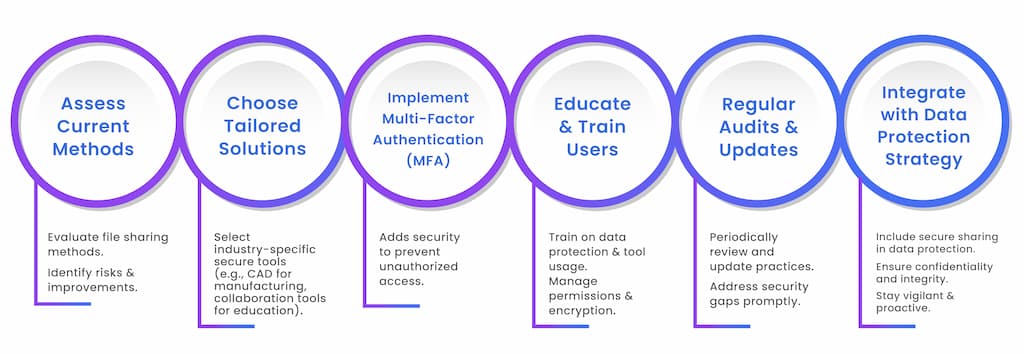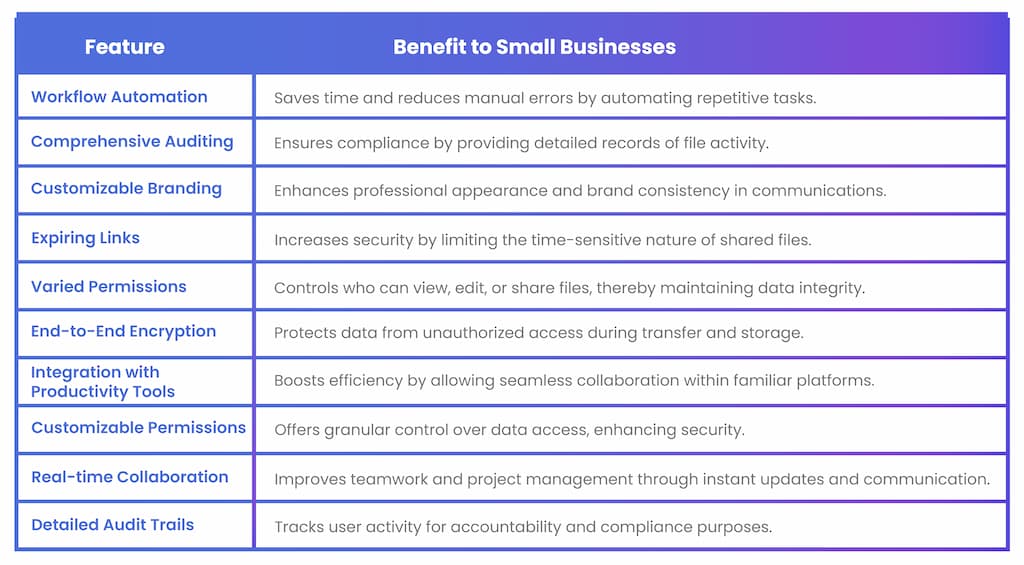The only secure computer is one that’s unplugged, locked in a safe, and buried 20 feet under the ground in a secret location… and I’m not even too sure about that one.
– Dennis Hughes
Why Secure File Sharing Matters for Small Businesses

Imagine discussing a confidential client project or sharing sensitive financial data only for it to fall into the wrong hands. Such scenarios underline the importance of secure file sharing for small businesses. Protecting your data from online threats and ensuring that only authorized personnel have access are crucial steps towards maintaining your company’s integrity and trustworthiness.
Secure file sharing solutions achieve this by offering robust encryption, user authentication, and permission controls. This means that even if data is intercepted, it remains unreadable to unauthorized individuals. Additionally, features like audit trails allow you to monitor who accessed which files and when, giving you transparency and control over your business information.
Many industries, including finance and manufacturing, have unique requirements and face specific risks. Financial services, for example, must comply with stringent regulations to safeguard client information and ensure confidentiality.
In manufacturing, secure file sharing can streamline workflows and boost productivity, allowing for seamless collaboration on projects while safeguarding intellectual property.
Cloud-based file sharing has become increasingly popular among small businesses due to its scalability and cost-effectiveness. By utilizing cloud services, you can benefit from enhanced security measures that protect your data around the clock.
Whether you’re handling legal documents, HR information, or proprietary data, secure file sharing solutions ensure that your business operations run smoothly and securely.
Ensuring Data Protection: Best Practices
In today’s digital landscape, safeguarding your business’s data is not just recommended—it’s imperative. Implementing secure file sharing solutions helps ensure that sensitive information remains protected from unauthorized access and cyber threats. Here are some best practices to help you keep your data safe:
- Encryption: Always use robust encryption methods to protect your files during transfer and storage. Advanced encryption standards (AES) are highly recommended.
- Password Protection: Set strong, unique passwords for file access, and change them regularly. Use multi-factor authentication (MFA) to add an extra layer of security.
- Expiring Links: Utilize expiring links for shared files to limit the time they are accessible. This minimizes the risk of unauthorized access over time.
- Permissions Management: Assign specific permissions to users and groups based on their roles. Ensure that sensitive information is only accessible to those who need it.
- Regular Backups: Implement automatic backups to prevent data loss. Ensure backups are securely stored and easily recoverable in case of data breaches or accidental deletion.
- Activity Monitoring: Continuously monitor file sharing activity to detect any suspicious behavior. Regular audits can help in identifying and addressing potential vulnerabilities.
- Compliance Tools: Make use of tools that help you comply with regulations such as GDPR, HIPAA, and SOX. These will assist you in maintaining data protection standards required by law.
By adhering to these practices, you can safeguard your business data, ensuring it remains confidential and secure. This not only helps in maintaining trust with your clients but also positions your business as a responsible and reliable entity in the market.
How to Implement Secure File Sharing in Your Workflow
Integrating secure file sharing into your workflow doesn’t have to be daunting. Start by assessing your current file sharing methods. Evaluate any existing risks associated with these methods, and identify areas that require improvement. This foundational step ensures that your chosen solution addresses specific vulnerabilities and aligns with your business needs.
Next, choose a secure file sharing solution tailored to your industry. For instance, manufacturing businesses might benefit from tools that enable secure sharing of CAD files and production schedules.
Higher education institutions, on the other hand, should look for solutions that facilitate safe collaboration on group projects and protect sensitive research data. Investing in a solution that meets your industry’s unique requirements can significantly boost efficiency and protect critical information.
Once you’ve selected the appropriate tool, implement multi-factor authentication (MFA) to add an extra layer of security. This step is vital as it helps to prevent unauthorized access, even if login credentials are compromised.
Additionally, ensure that all users are educated about the importance of data protection and trained on how to use the new file sharing system effectively. This includes understanding how to manage permissions and utilize encryption features provided by the tool.
Regularly audit and update your secure file sharing practices to adapt to evolving threats. Periodic reviews can help you identify potential security gaps and take corrective actions swiftly.
Including secure file sharing protocols in your overall data protection strategy will provide a robust framework for maintaining the confidentiality and integrity of your business information. It also highlights the importance of staying vigilant and proactive in safeguarding your digital assets.
Comparing the Best Secure File Sharing Tools
When looking at secure file sharing tools, you’ll notice a variety of features designed to protect your data while enhancing your team’s productivity. Here, we compare some of the best options available:
- Files.com: This tool is well-regarded for its security, compliance, and automation capabilities. It integrates seamlessly with various productivity tools and offers robust features like workflow automation and comprehensive auditing. Files.com is an excellent choice if you need extensive security features and detailed compliance reporting.
- ShareFile by Citrix: Known for its secure file storage, sharing, and synchronization, ShareFile also integrates with popular productivity applications. Customize your branding for a more professional appearance. However, it’s on the pricier side, making it less ideal for budget-conscious businesses.
- Dropbox Business: With a user-friendly interface and strong security measures, Dropbox Business offers a versatile solution for file sharing. Features include expiring links, varied permissions, and integration with many third-party applications. It’s particularly suited for teams that prioritize easy collaboration and robust security.
- Google Drive for Work: Google Drive offers collaborative tools with end-to-end encryption and extensive sharing options. Its real-time collaboration capabilities make it a favorite among teams needing efficient workflow management, although its privacy protocols have been questioned in the past.
While each of these tools has standout features, a Virtual Data Room excels in providing the highest level of security and compliance for sensitive data. Designed specifically for secure document sharing and collaboration, VDRs offers comprehensive encryption, customizable permissions, and detailed audit trails, making it the best solution for businesses looking to ensure the utmost protection of their critical information.
What are the potential risks of not using secure file sharing solutions in small businesses?
Opting out of secure file sharing solutions can expose your small business to a myriad of serious risks. Here’s a rundown of the key dangers:
- Data Breaches: Unauthorized access to sensitive information can lead to significant financial losses and damage your business’s reputation.
- Compliance Violations: Failing to adhere to industry regulations regarding data protection can result in hefty fines and legal repercussions.
- Intellectual Property Theft: Proprietary information, trade secrets, and confidential business strategies can be stolen or leaked, severely impacting your competitive edge.
- Operational Downtime: Cyberattacks like ransomware can paralyze your operations, leading to costly downtime and loss of productivity.
- Client Trust Erosion: Clients expect their data to be handled securely. Breaches or leaks can undermine client confidence and harm long-term relationships.
- Financial Losses: Direct financial hits stem from fraud, data restoration costs, and potential lawsuits following a security compromise.
- Stolen Credentials: Lack of secure sharing can inadvertently reveal login details, leading to unauthorized access to critical systems and further compromising security.
Given these risks, investing in a robust secure file sharing solution is not just a best practice but an essential requirement to safeguard your small business’s future.









